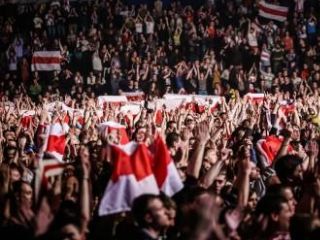Poland and Germany were both initiators and drivers of a New Eastern policy linked to the Eastern neighborhood and Russia/Soviet Union.
Andrei Yahorau: Conflicts with Russia promoted the growth of national consciousness among Belarusans

Without realizing the need for other ways and forms of development different from the authoritarian Eurasian way, Belarus has no future.
Russian occupation of Crimea echoed with “mild Belarusization” that Russian and Belarusan political scientists have started talking about.
What does it imply? Is it happening in our society? Is the growth of national consciousness among Belarusans a reality or a mirage?
These questions in the talk with the EuroBelarus Information Service covered Andrei Yahorau, Director of Centre for European Transformation.
— Basing on the social poll conducted by Independent Institute of Socio-Economic and Political Studies (IISEPS) in June, social scientist Sergey Nikolyuk concluded that in the context of Ukrainian events national mobilization in Russia caused national mobilization in Belarus, as well as the appearance of pro-Belarusan moods in the society. Did you notice these changes in the society?
— I didn’t; vice versa, it seems that Russian propaganda worsened the division within the Belarusan society and deepened pro-Russian trends and tendencies.
Belarusization used to be under way in our country. Conflicts with Russia, which were taking place throughout 20 years of our country’s independence, promoted the growth of national consciousness among Belarusans.
Ukrainian events turned the attention of the Belarusan authorities towards the national identity. However, over all these years the state hasn’t yet created an ideological basis for the existence of the independent Belarus.
— What are the fears of the people who are making a fuss about the appearance of “nationalists” in Belarus?
— It is about the distorted life perception that the supporters of the “Russian world” have, for whom Belarus doesn’t exist as a separate state, and Belarusans don’t exist as a nation. It doesn’t coincide with their understanding of the “Russian world”, but only causes irritation.
— First time over the twenty years of ruling the country Lukashenko gave a speech in Belarusan. Our political scientists have interpreted this fact as a shield from the “Russian world”. Don’t you think that this conclusion is far-fetched?
— With all the Ukrainian events the problem of symbolic Belarus’ independence escalated. Lukashenko has to bow to Russia, even though he doesn’t want to do that. This situation is unbearable for him, and Belarusan elites already express their confusion. So the Belarusan regime is making up ritual symbolic steps to demonstrate its independent stance. Both the speech in Belarusan as well as the statement about making all Belarusans who fight in Ukraine criminally liable is a demonstration of sovereignty. Lukashenko wants to show that the situation at the Belarusan territory is under the control of the authorities and under Lukashenko’s personal control, and he won’t allow Ukrainian scenario happen in Belarus.
— Some Belarusan political scientist concluded that the actions of the national nomenclature clearly comprise the fear of Belarus-Russia integration, which, according to the officials, is a direct threat to their political and economic status. He forecasts two possible development scenarios for Belarus: to become a nationalistic enclave similar to the Baltic States or to lose national consciousness forever, which would be gradually getting destroyed by globalization and westernization. But what is the real direction that the Belarusan authorities are leading Belarus to?
— Lukashenko is not leading the country anywhere, and this is the main problem for Belarus. The regime has no conscious development policy for Belarus. The current policy is about the situational politics and attempts to make profit out of any integration formations.
Belarus doesn’t want to cater to Russia, but it is made to; still, for now the country has a possibility to resist. However, without realizing the need for other ways and forms of development different from the authoritarian Eurasian way, Belarus has no future. With each next day Belarus has less chances for maneuvers, and it is too dangerous to try and trade the sovereignty.
Others
-
Uladzimir Matskevich: The sooner the "Union State" is denounced, the better for Belarus
Not only does the “Union State” undermine the establishment of civilized relations with Europe, but it hinders the possibility of normal relations between Belarus and Russia.
-
Uladzimir Matskevich: The regime can no longer control the situation in the country
The authorities are unable to prolong the social contract with the people: there is no way out of the social crisis.
-
Press release of the BNP in connection with the next round of the dialogue in the format of the EU-Belarus Coordination Group
Belarusan National Platform of the Eastern Partnership Civil Society Forum welcomes the dialogue process in the format of the EU-Belarus Coordination Group, the third round of which was held in Minsk on 3-4 April 2017.
-
Hennadiy Maksak: Europe must react adequately to the events in Minsk
A new wave of political repressions should make the EU return to tougher policy towards the Belarusan regime.








Comments
From farewell to a new Eastern policy and towards a new development
Poland and Germany were both initiators and drivers of a New Eastern policy linked to the Eastern neighborhood and Russia/Soviet Union.